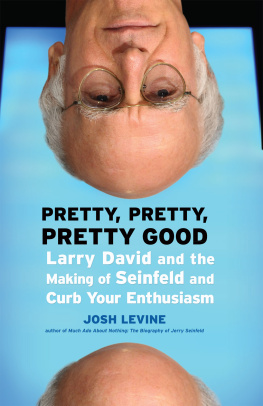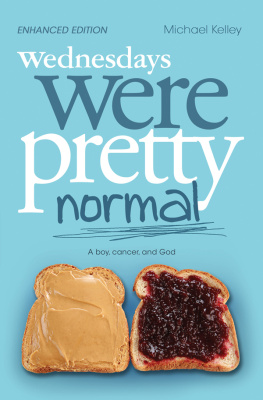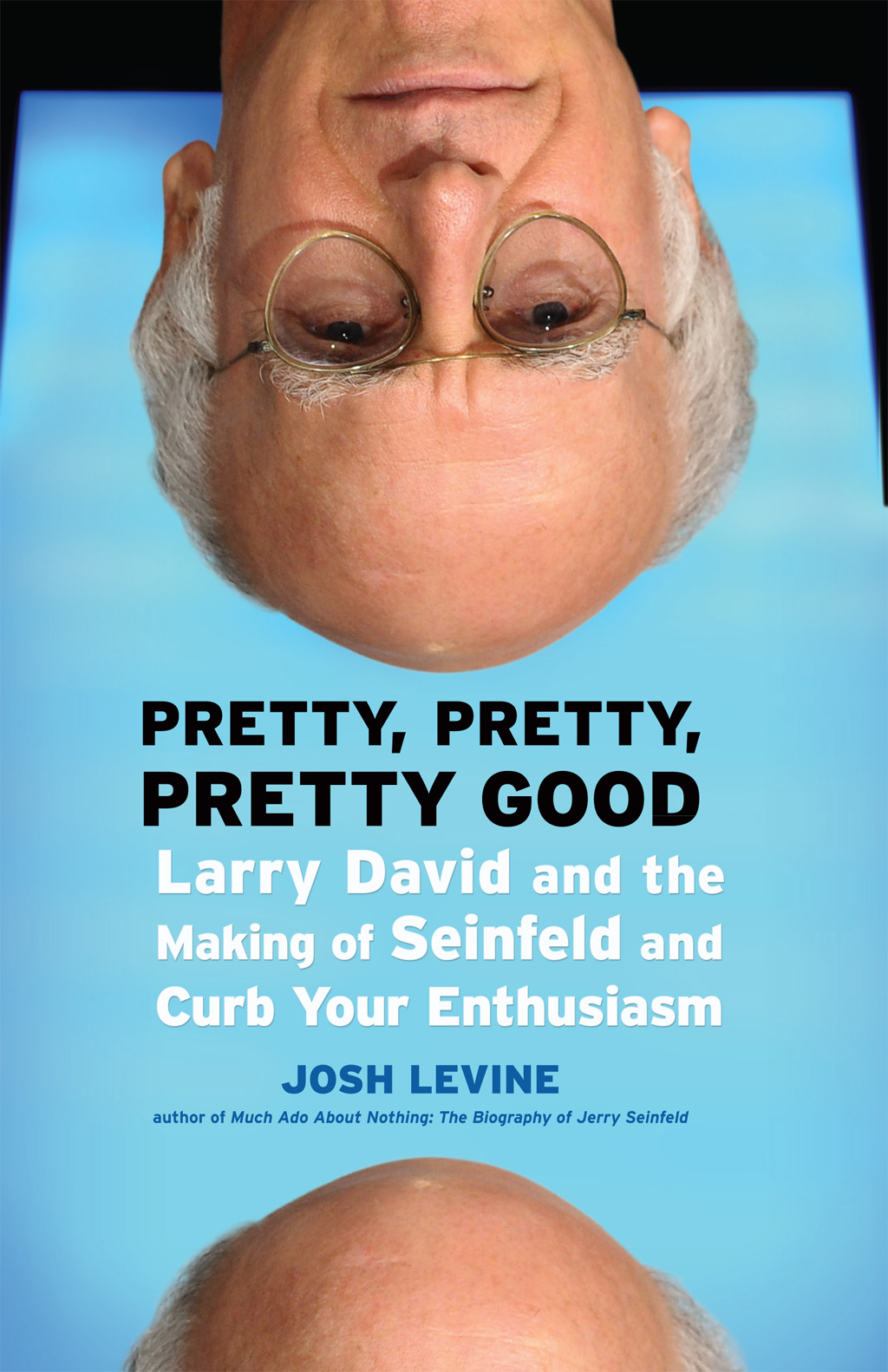PRETTY, PRETTY, PRETTY GOOD
Larry David and the making of Seinfeld and Curb Your Enthusiasm
Josh Levine
ECW Press
ECW Press
Copyright Josh Levine, 2010
Published by ECW Press
2120 Queen Street East, Suite , Toronto, Ontario, Canada M4E 1E2
416.694.3348 / info@ecwpress.com
All rights reserved. No part of this publication may be reproduced, stored in a retrieval system, or transmitted in any form by any process electronic, mechanical, photocopying, recording, or otherwise without the prior written permission of the copyright owners and ECW Press.
library and archives canada cataloguing in publication
Levine, Josh
Pretty, pretty, pretty good : Larry David and the making of Seinfeld and Curb Your Enthusiasm / Josh Levine.
ISBN 978-1-55022-947-9
1. David, Larry. 2. Curb your enthusiasm (Television program).
3. Seinfeld (Television program). 4. ComediansUnited StatesBiography.
5. Television producers and directorsUnited StatesBiography. i. Title.
PN1992.4.D39L49 2010 791.4502'32092 C2010-901398-0
Cover and Text Design: Tania Craan
Cover Image Photo by Jason LaVeris/FilmMagic
Typesetting: Mary Bowness
Production: Troy Cunningham
Printing: Easy ePub / Easy Press
This book is set in Bembo and Interstate.
The publication of Pretty Pretty Pretty Good: Larry David and the Making of Seinfeld and Curb Your Enthusiasm has been generously supported by the Government of Ontario through the Ontario Book Publishing Tax Credit, by the OMDC Book Fund, an initiative of the Ontario Media Development Corporation, and by the Government of Canada through the Canada Book Fund.
Photo Section Credits:
1: ABC Photo Archives/ABC via Getty Images; 2: Dennis Plehn/ABC via Getty Images; 3: Bob DAmico/ABC via Getty Images; 4: David Hume Kennerly/Getty Images, Joseph Del Valle/NBCU Photo Bank via AP Images; 5: Chris Haston/NBCU Photo Bank via AP Images; 6: Richard Corkery/NY Daily News; 7: Archive via Getty Images, AP Photo/Matt Sayles; 8: David Hume Kennerly/Getty Images, AP Photo/Chris Polk
PRINTED AND BOUND IN THE UNITED STATES
For Yoyo,
the other fan in the house
Introduction
The Near Failure
Curb Your Enthusiasm is a show that divides people. There are those who love it, find it excruciatingly funny, and revel in its taboo-breaking humor, in the aggressive outbursts of its characters, in its depiction of social, moral, physical, and sexual humiliations. They see Larry David as a Freudian id out of control, unable to conjure up the social restraints that stop the rest of us from saying what we really think and feel. And yet they appreciate that Larry, for all his selfishness, his childlike and neurotic behavior, is a man who enjoys and even embraces life.
These fans see the show as a step up from the more conventionally framed Seinfeld, with its traditional set, three-camera shooting, punch lines, and laugh track. They consider Curb a far less comfortable show: darker, edgier, and more honest. They appreciate its use of improvisation and handheld camera work, the result of which is rougher and gives a more real feel to the show, despite the often-complicated plotlines. They appreciate its fearless examination of cultural attitudes to religion, race, physical disabilities, and sex in a manner that, while highly politically incorrect, is in no way conservative or right-wing. They see it as just as funny as Seinfeld but in a more painful way.
And then there are those who cant stand Curb Your Enthusiasm, who have tried to watch it and find themselves unable to sit through its excruciating social embarrassments, its scenes of characters almost apoplectic with rage, saying things that should never be said, and its relentless references to sex acts, sex parts, rashes, bruises, injuries, urination, and defecation. What, they say, is enjoyable about any of that?
Whats amazing is that the descriptions given by both sides are totally accurate. The show is all these things. And it is these things because of one man and his skewed, dark, hilarious, distressingly honest revelations of human behavior. Larry David.
As the co-creator of Seinfeld and the author of nearly sixty of its scripts, Larry David was already one of the most successful television creator/writers of all time before Curb Your Enthusiasm. His wealth has been estimated at somewhere in the vicinity of $300 million and even as you read this it is growing rapidly from Seinfelds syndication rights. Now, as the creator, writer, and star of Curb Your Enthusiasm a show with a large, cultlike following compared with the blockbuster Seinfeld he has become one of the most innovative artists of the small screen.
When someone is rich and famous it seems to the world to have been inevitable. But with Larry David, success was no sure thing. In his early forties, he was a little-known, modestly successful comic, receiving muted responses from audiences and low pay for his gigs. He had a crummy apartment and sometimes made barely enough money for food. He had tried some television writing, making money for short periods, but had made no impression on the shows he worked for. He was frustrated and even angry, not only by the lack of success but by the lack of understanding and interest from the comedy-club audiences. In fact, he didnt like the audience much, which may be why they, in turn, didnt like him.
Larry David looked, in fact, like he was headed for failure. But even so, he refused to compromise, to change his act or his comic approach in order to pander to an audience that he considered to have grown soft and complacent from watching Tonight Showstyle comics. He had a fresh, unusual view, not always a pleasant one, and though he was no intellectual (he didnt much like reading books) he had insights into ordinary, seemingly trivial aspects of human behavior that others had missed.
These innovations did not come from nowhere. They were rooted in his Brooklyn Jewish middle-class upbringing. They were rooted most particularly in Jewish comedy, a humor descended from the Jewish tummler, the comic figure who would joke and ridicule and tease guests at traditional Jewish weddings back in the shtetls of Europe. It was a humor that found its way into American vaudeville and then into the mouths of the great Jewish comedians of the past (Groucho Marx, Jack Benny, Shelley Berman, Don Rickles, Lenny Bruce, Woody Allen), a dark comedy of cynicism, complaint, aggravation, aggression, humiliation, neediness, and restless energy an insider kind of humor that by some miracle became popular with the larger American audience.
When his mother would phone Larry to ask how he was doing, Larry wouldnt want to tell her the truth. Pretty, pretty, pretty good, he would say, each pretty qualifying the one before. It is very possible that Larry David could have continued to travel the small New York comedy-club circuit, scraping by, becoming ever more disgusted and bitter. Or he might have finally quit, to take on the kind of low-level job that he had worked in after college. But another comedian, an infinitely more successful one, as much a professional colleague as a friend, asked Larry for help. A television network had asked him to develop a show, and the comic, Jerry Seinfeld, had a hunch that Larry might be able to help him.











